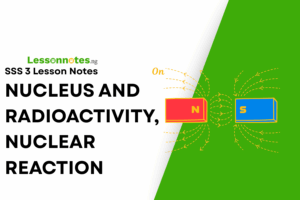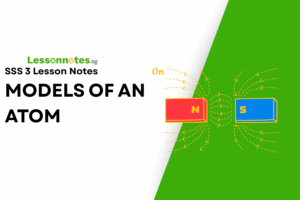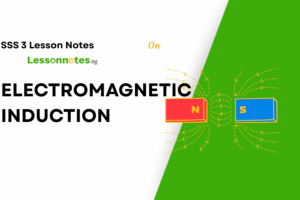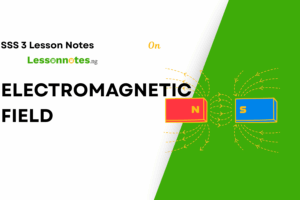Energy Quantization SS3 Physics Lesson Note
Download Lesson NoteTopic: Energy Quantization
Bohr suggested that the electron in the atom exists in discrete energy known as quantization which can be removed from one level to the other. Energy in such bodies is emitted in separate or discrete energy packets called energy quanta (E0
E =hf
H = planckÂs constant.
THE ENERGY LEVEL IN AN ATOM
Electrons in atoms are arranged around their nuclei in a position known as energy level or electron shell. It requires more energy to remove electrons from the first energy level than to remove electrons from any of the other higher levels. The energy of an electron is given by the relation.
E = – 1 R
n2
n = electron quantum number
R = a constant
The minus sign signifies that work must be done on the electron to remove it from the atom.
The ground state is the stable state of an atom corresponding to its minimum energy. When an atom is heated with an energetic particle, the atom is excited. An excited state is an allowed state of higher energy when the atom is unstable. One electron volt (IeV) is the energy acquired by an electron in falling freely through a p.d of 1
Volt = 1.6 x 10 -19J.
During the excitation from a lower energy level, the potential energy is converted into Kinetic energy so that the electrons eventually acquire a velocity given by:
- E = ½ MV2 = eV.
The energy gained by electron = charge x p.d = eV. Therefore, the electron moves from one level to the other according to the relation.
En  Eo = hf = eV
λ
Worked example
- The change in the energy level of an electron in an atom is 6.2 x 10 -21J. Calculate :
(a) the frequency of the photon
(b) the wavelength
( C = 3.0 x 108 ms -1, h = 6.625 x 10 -34Js)
â E = En-Eo = 6.2 x 10 -21J
âE = hf
f = âE = 6.2 x 10-21
h 6.625 x 10-34
f = 9.358 x 10 2Hz
But C = f λ
:. λ = C = 3.0 x 108â
f 9.4 x 1012
- An atom excited to an energy level E2 = -12 .42 x 10-19J falls to a ground level of energy Eo = – 30.3 x 10-19J. Calculate the frequency and the wavelength of the emitted photon.
âE = E2- Eo
= -12.42 x 10-19 – ( -30.3 x 10-19J )
= 17.88 x 10-19J
f = âE = 1.788 x 10-18
h 6.625 x 10-34
f = 2.698 x 1015 Hz.
- The ground state of hydrogen is -26.3eV and the second state is -10.3eV. Calculate the wavelength of the radiation if the electron returns to the ground state.
âE = E2 – EO = -10.3EV – (-26.3ev)
= 16ev
1ev = 1.6 x 10-19 J
:. 16ev = 16 x 1.6 x 10-19J
âE = hf = hc
λ
:.λ = hc = 6.625 x1034 x 3.0 x 108
âE 16 x 1.6 x 10-19
= 1.9875 x 10-25
- x 10-18
λ = 7.76 x 10-19 m
- If the p.d by which an electron moves is 1.5kv. Calculate the velocity with which the electron moves if the ratio of its charge to mass is 1.9 x 1011 c kg-1 (b) the kinetic energy.
KE = ½ mv2 = ev
2ev =mv2
v2 = 2ev
m
But e/m = 1.8 x 1011
V = √2 x 1.5 x 103 x 1.8 x 1011
V = 2.3 x 107m/s
Ke = eV
= 1.6 x 10-19 x 1.5x 103
= 2.4 x 10-16J.
LINE SPECTRA FROM HOT BODIES
If the light of excited gas is examined in a spectrometer, an emission spectrum is seen e.g. Neon produces a line spectrum. The spectrum consists of a number of well-defined lines, each having a particular wavelength and frequency.
ABSORPTION SPECTRA
Absorption spectra are dark lines in the emission spectrum of a heated substance due to absorption of radiation. Electrons absorb radiation if they jump from lower energy level to a higher energy level.
SPECTRA OF DISCHARGE LAMP
If a gas is put into a discharge tube and if its pressure is progressively reduced using a power pump.
When a high p.d is applied at low pressure, an electric discharge takes place in the tube and the gas glows. The gas glows because its atom is given energy by the flow of electricity through the tube. The colour of the gas depends on the nature of the gas used.
Reading Assignment.
- New School Physics pgs.
WEEKEND ASSIGNMENT
- when an atom is in a ground state, it is said to be
(A) excited (B) stable (C) ionised
- Which of the following has the greatest penetrating power?
(A)Beta ray (B) Gamma rays (C ) X- rays.
- Which of the following gives rise to the line spectra obtained from atoms?
(A)change of electrons from a higher to a lower energy level
(B) the potential energy of the electron inside an atom
(C ) Excitement of an electron in the atom
- Which of the following statements is correct about cathode rays? They are fast-moving (A) atoms (B)ions (C ) electrons
- The nucleon number and the proton number of a neutral atom are 238 and 92 respectively. What is the number of neutrons in the atom? (A ) 146 (B) 330 (C ) 73.
Theory
- Explain the term excitation
- An electron jumps from one energy level to another in an atom radiating 9.0 x 10-19J. if h = 6.6 x 10 -34jS and C = 3.0 x 108m/s, what is the wavelength of the radiation.





















